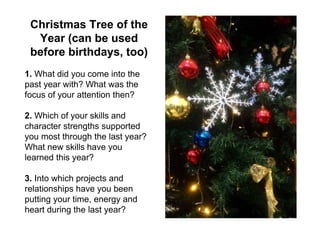"Hijacking the New Year" and Other Practices of Anti-Depression
- 1. “Hijacking the New Year” and Other Practices of Anti- Depression Daria Kutuzova, Ph.D.
- 2. Daria: • 1995 > developmental psychology • 2003 > narrative therapy and community work • 2008 > therapeutic writing (journaling, autobiographical stories, poetry) • 2012 > depression (and practices of anti-depression) • 2016 > (living well with) chronic illness
- 3. The “Exploring Depression” Project, started in 2012 * image by ZEISS Microscopy on Flickr, Creative Commons license https://creativecommons.org/licenses/by/2.0/
- 4. Depression Externalized • Pathways into Depression • Metaphors of Depression • Tricks of Depression • Lies of Depression • Allies of Depression • Effects of Depression
- 6. Imagine someone coming to your place, uninvited, and hurling all this verbal abuse at you. What would you do?
- 7. it is not just only “in our heads”, and it is not only our personal responsibility to deal with it
- 8. Allies of Depression in the Society (2)
- 11. – Dr. David Denborough, in “Collective Narrative Practice”, p. 192. “The person is not the problem, the problem is the problem and… the solution is not only personal”.
- 12. How can people who care about the person who is struggling with depression, participate in the practices of anti-depression? What can be done to counter-act the lies of depression?
- 13. Creating Material for Potential Unique Outcomes (exceptions from the story about the person and their life that Depression is trying to tell)
- 15. The predictable “time-bombs” that depression can use as triggers Calendar-based “festivities”: • The New Year • St.Valentine’s Day • birthdays and anniversaries
- 16. The (Un)Happy New Year How Depression uses the usual modes of “celebration” as triggers: • “Taking stock” of the past year (practices of comparison) • Staying at home for NY as a failure to belong • Anticipated lack of the “miracle of renewal” • Anticipation of “same ol’, same ol’” boring “festivities” • Anticipation of things getting worse in the coming year How we can engage in practices of Anti- Depression: • Make sense of the past year in the narrative way (the “Christmas Tree of the Year”) • Deconstruct a good NY party and reconstruct it online in a funny and lighthearted way • Create a miracle of renewal a little bit ahead of the New Year - “hijack” the New Year
- 17. Christmas Tree of the Year (can be used before birthdays, too) 1. What did you come into the past year with? What was the focus of your attention then? 2. Which of your skills and character strengths supported you most through the last year? What new skills have you learned this year? 3. Into which projects and relationships have you been putting your time, energy and heart during the last year?
- 18. 4. What were the most magical, sparkling and meaningful moments of the last year? 5. What were your successes in the last year, however small or big? What are you proud of? 6. What did you pleasantly surprise yourself with in the last year? What good things you didn’t expect, but they happened anyway? 7. What gifts have you received in the last year - from people and from life in general? 8. What have you lost, had to let go of or had to put on pause in the last year? 9. Who has been a really good friend to you in the last year? With whom you would like to celebrate together?
- 19. 10. What are your dreams for the coming year? What are your wishes for yourself?
- 20. 11. What were the good habits that you tried to learn/create in your life during the last year, that did not fully "stick", but while you were doing the routines, it was good? If we abandon the idea of writing grand, "all or nothing", New Year resolutions, if we decide not to force ourselves into committing fully to doing something for the whole year, but instead look for shorter time increments (a week, a month at the most), which good routines that did work for you for a while during the last year (and earlier, too), you would like to try to do again in the coming year?
- 24. The (Lonely) Day of Lovers How Depression can use it as a trigger: • only one phase of only one type of relationships is celebrated • in a rather kitsch commercialized way • all other experiences are rendered invisible • many people are excluded and this can trigger feelings of failure How we can engage in practices of Anti-Depression: • celebrate St.Mel’s Day (February the 6th) - the day of singles, the day of being in a good relationship with oneself • richly describe and celebrate other “facets” of relationships • explore our own preferred ways of celebrating St.Valentine’s Day • create alternative cards (“against the hegemony of hearts”)
- 25. “…St.Mel's Day, which falls upon the 6th of February, is the day of celebrating good relationships with oneself. For me it is the day when I do my "audit" of expectations - am I grumpy because I am not giving myself the care, the fun and the pleasure that I need, because I wait till somebody else gives them to me, and they do not oblige? It is the day when I stop being grumpy and go and take care of some of my own expectations by fulfilling them myself”.
- 27. The e-book “Always Chosen” with some descriptions of different types of relationships can be downloaded from http://writecompass.com/always-chosen- celebrating-different-aspects-of- relationships/
- 30. Cards against the Hegemony of Hearts

































